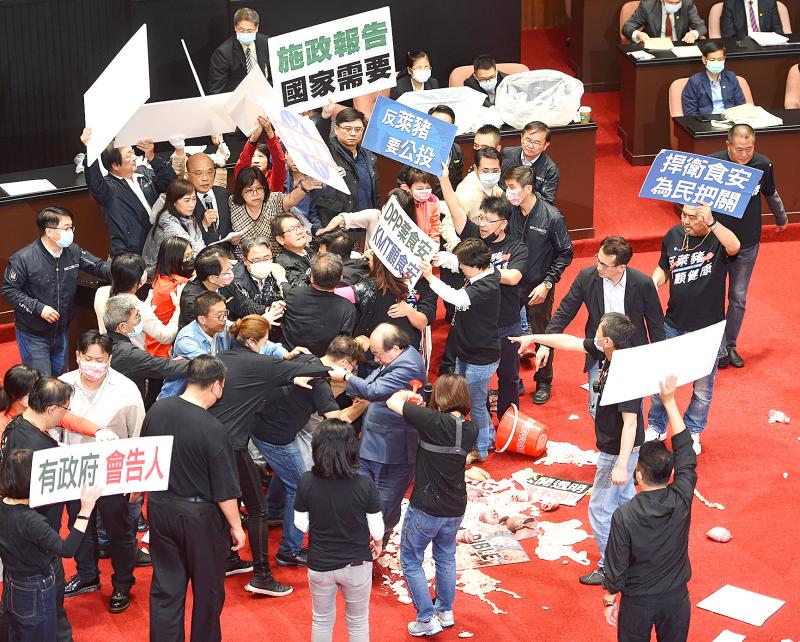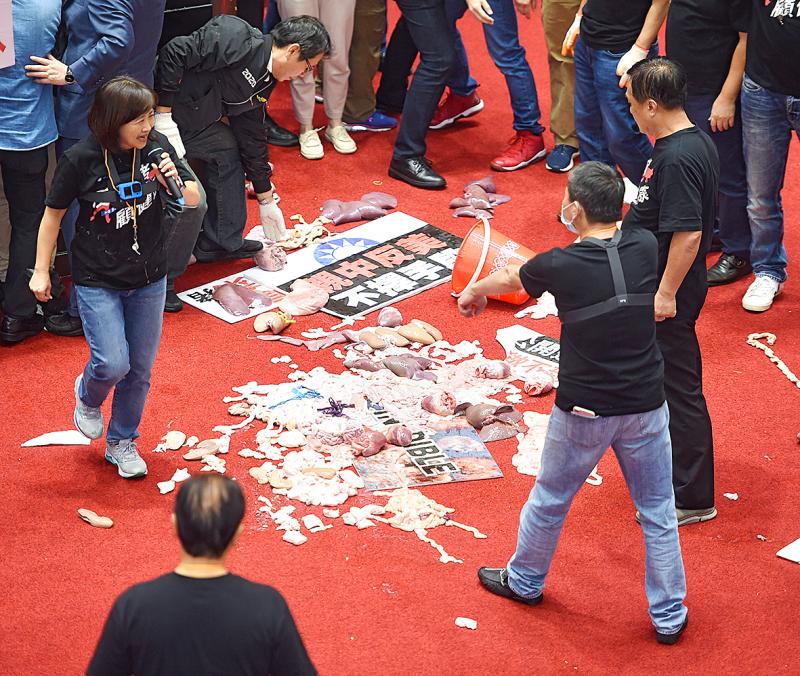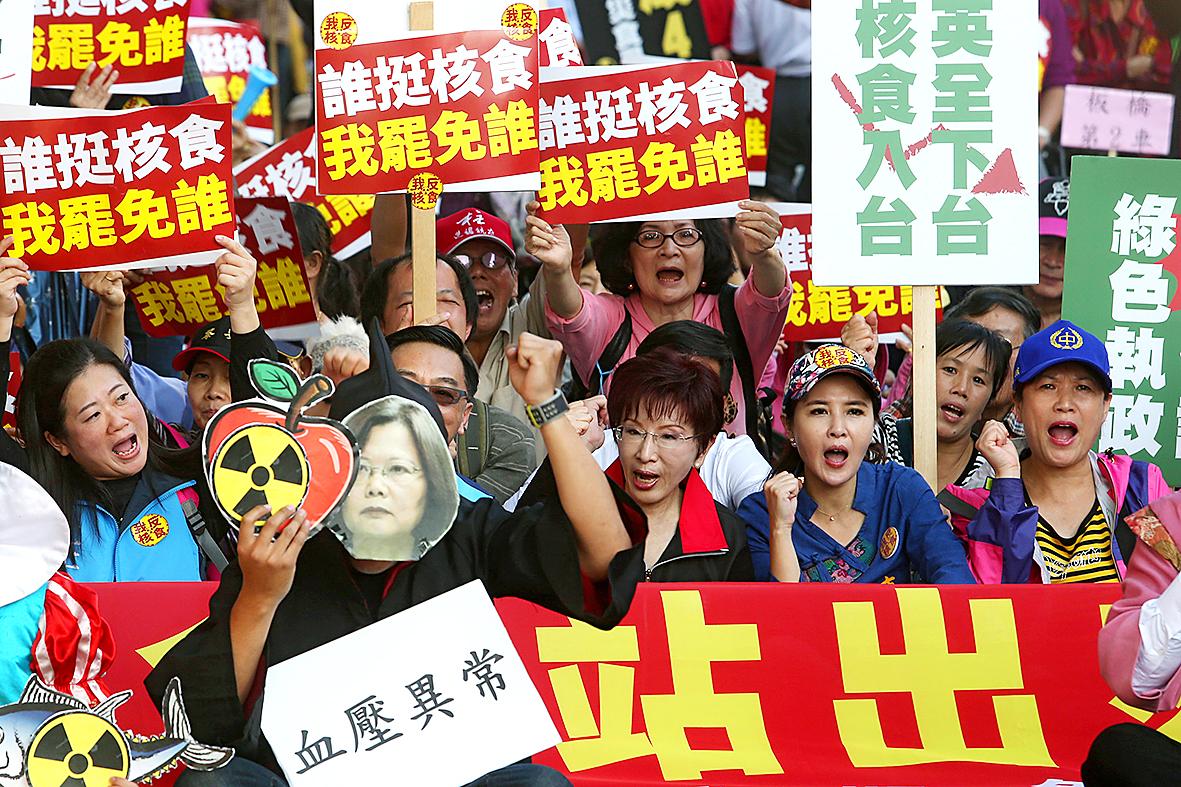In September last year the Chinese Nationalist Party (KMT) launched its campaign for a public referendum to ban the importation of pork products containing ractopamine. The KMT was ostensibly responding to President Tsai Ing-wen’s (蔡英文) decision to open Taiwan’s markets to US pork products containing ractopamine.
Ractopamine had long been a sore point in US-Taiwan relations. The US had relentlessly pressed Taiwan to open its market to pork made with ractopamine, a leanness enhancer banned in many countries, and Taiwan, where pork is a way of life, had long resisted. There was deep fear that local pig producers would be put out of business by inflows of US pork. However, in pursuit of a trade agreement with the US, the Tsai administration at last gave in on the issue, since the US would not.
RACTOPAMINE HYPOCRISY

Photo: Liu Hsin-de, Taipei Times
The KMT campaign for a referendum on the question “Do you agree that a ban should be in place to prohibit the import of pork and pork products containing ractopamine?” sparked much laughter among Taiwanese and Taiwan watchers. It featured KMT politicians driving around in cars mocked up like pigs to promote the referendum. In one vile incident, KMT lawmakers threw pig guts and pig skin at Premier Su Tseng-chang (蘇貞昌) as he addressed the legislature.
The hypocrisy was thick enough to slice and form cakes suitable for frying in lard. After all, during the administration of president Ma Ying-jeou (馬英九) of that selfsame KMT, the party had strongly supported opening Taiwan’s markets to US pork containing ractopamine.
In July of 2012, Ma announced that Taiwan would follow international standards for ractopamine levels in pork (essentially the same decision Tsai would make). He also announced that ractopamine-enhanced beef would be permitted in Taiwan, a decision that sparked protests in which chunks of beef were hurled at posters of Uncle Sam. Like Tsai, Ma made these announcements in the hope that the US would work on bilateral trade agreement.

Photo: Liu Hsin-de, Taipei Times
Yes, someday Charlie Brown will kick that ball, and Taiwan and the US will have their bilateral trade agreement.
Since politics is where irony goes to die, at that time, the Democratic Progressive Party, currently the ruling party, had stood firmly against the import of meat containing ractopamine residues. Much to the cynical amusement of Taiwan watchers, the two parties have flip-flopped on the ractopamine issue.
IMPORTS FROM FUKUSHIMA

Photo: CNA
This is not the first time that the KMT has drummed up a campaign against food imports in the midst of trade talks. Readers may recall that in 2018 there was a referendum against imports of food from Fukushima in Japan. Supporters had argued that food from the area, the site of the nuclear disaster at the Fukushima Daiichi Power Plant complex after the great tsunami of 2011, was not safe.
At that time Taiwan was hoping to enter the Comprehensive and Progressive Agreement for Trans-Pacific Partnership (CPTPP). The referendum put a spike in relations with Japan, whose permission was necessary to enter the CPTPP. Japan had taken on a leadership role of the original Trans-Pacific Partnership after Trump pulled the US out.
That referendum drive was also led by the KMT, whose then-Deputy Chair, Hau Long-bin (郝龍斌), stoked tensions by deliberately and publicly pointing out that a yes-vote might harm relations with Japan. Hau complained that the Taiwan-Japan relationship has always been unfairly in Japan’s favor, and that if Japan blocked Taiwan’s entry because of the ban on food from Fukushima, then Tokyo’s friendship with Taiwan would be shown to be a “sham.”
He also called on the “two sides of the Strait” to show solidarity in opposition to food imports from Fukushima, although Beijing was at that time accepting food imports from Fukushima. This was par for the course for KMT calls for unity with China — loudly made in Taiwan, steadfastly ignored in Beijing.
The attack on Fukushima products was cleverly targeted. The Abe government was strongly supportive of nuclear power and eager to promote Fukushima as a safe place to visit and source food from. Thus, it would be particularly sensitive to rejections of food from the area.
It is easy to laugh at the KMT’s hypocritical antics, but they are part of a well-conceived, entirely pro-China and long-term program of separating Taiwan from its two major supports, Japan and the US. If the KMT cannot get Taiwanese to turn to China, it figures it can at least get Tokyo and Washington to consider Taipei an unruly and unreliable partner.
TRADE AGREEMENT
Tsai’s decision to open Taiwan’s markets to meat containing ractopamine is a political gamble. If Washington does not respond with meaningful moves toward a full-blown trade agreement, Tsai will take some domestic political damage, while the KMT will pounce on a failure with glee.
It will do this not only to leverage the domestic effects, but also to further irritate relations between Taiwan and the US, all the while claiming that only getting closer to China can save Taiwan.
Because of this potential for further disruption of the Taiwan-US relationship by the KMT, the Tsai administration should prepare for (yet another) disappointment in Taiwan’s long quest for a bilateral trade agreement with the US. A recent piece by Evan Feigenbaum and Barbara Weisel at the Carnegie Endowment for International Peace observes that because the administration of US President Joe Biden is still sorting out its trade priorities, it could be another 12-18 months before the US gets around to even thinking about a trade agreement with Taiwan.
Feigenbaum and Weisel point out that in the absence of a true bilateral trade agreement, Taiwan and the US can make progress in specific areas of cooperation. They instance as possibilities agreements on sci-tech policies and innovation, on investment screening, on renewable energy and sustainability and on women’s economic empowerment. They also argue that because large negotiations tend to become rigid and scripted, work should be conducted by smaller teams working in parallel.
These are excellent ideas that the Tsai administration should take up. We are far from a bilateral trade agreement, but small successes in negotiations on specific issues could be presented to the Taiwanese public as progress, blunting KMT criticisms. For its part, the US should embrace these smaller moves as a way to show its approval of Tsai’s decision to fully open Taiwan’s markets to US meat imports.
As for the voters, they should keep in mind: the KMT’s food safety crusades are poison pills. Don’t swallow them.
Notes from Central Taiwan is a column written by long-term resident Michael Turton, who provides incisive commentary informed by three decades of living in and writing about his adoptive country.

Jacques Poissant’s suffering stopped the day he asked his daughter if it would be “cowardly to ask to be helped to die.” The retired Canadian insurance adviser was 93, and “was wasting away” after a long battle with prostate cancer. “He no longer had any zest for life,” Josee Poissant said. Last year her mother made the same choice at 96 when she realized she would not be getting out of hospital. She died surrounded by her children and their partners listening to the music she loved. “She was at peace. She sang until she went to sleep.” Josee Poissant remembers it as a beautiful

March 2 to March 8 Gunfire rang out along the shore of the frontline island of Lieyu (烈嶼) on a foggy afternoon on March 7, 1987. By the time it was over, about 20 unarmed Vietnamese refugees — men, women, elderly and children — were dead. They were hastily buried, followed by decades of silence. Months later, opposition politicians and journalists tried to uncover what had happened, but conflicting accounts only deepened the confusion. One version suggested that government troops had mistakenly killed their own operatives attempting to return home from Vietnam. The military maintained that the

Before the last section of the round-the-island railway was electrified, one old blue train still chugged back and forth between Pingtung County’s Fangliao (枋寮) and Taitung (台東) stations once a day. It was so slow, was so hot (it had no air conditioning) and covered such a short distance, that the low fare still failed to attract many riders. This relic of the past was finally retired when the South Link Line was fully electrified on Dec. 23, 2020. A wave of nostalgia surrounded the termination of the Ordinary Train service, as these train carriages had been in use for decades

Lori Sepich smoked for years and sometimes skipped taking her blood pressure medicine. But she never thought she’d have a heart attack. The possibility “just wasn’t registering with me,” said the 64-year-old from Memphis, Tennessee, who suffered two of them 13 years apart. She’s far from alone. More than 60 million women in the US live with cardiovascular disease, which includes heart disease as well as stroke, heart failure and atrial fibrillation. And despite the myth that heart attacks mostly strike men, women are vulnerable too. Overall in the US, 1 in 5 women dies of cardiovascular disease each year, 37,000 of them